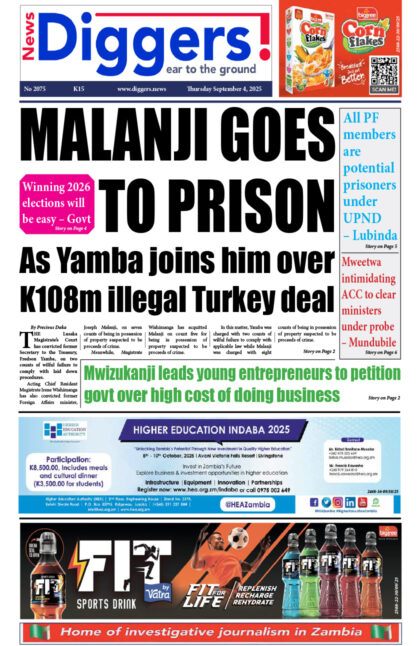In this audio excerpt from South Africa’s Radio 702FM, Zambia’s High Commissioner Emmanuel Mwamba takes a grilling as he answers complicated questions about Hakainde Hichilema’s treason case and the country’s decision to deport DA leader Mmusi Maimane.
He argues that international media was trivialising Hichilema’s treason case by basing it on the Presidential motorcade incident in Mongu.
When the interviewer asks him how a parking violation could amount to treason in Zambia, Mwamba explains that the treason charge against Hichilema was based on events dating back to October 2016.
The interviewer then asks Mwamba if the Zambian judiciary was so fragile that allowing one foreign person into the country to witness trial could affect the court’s decisions.
Defending the government’s approach not to let Maimane step out of the plane, Mwamba explained that it was common practice for immigration authorities across the world to enter an arriving airplane to send back an unwanted passenger, adding that it was also happening even in South Africa.
But the interviewer argues with Mwamba that South African authorities never enter a foreign aircraft to deport people, but instead waits for the passenger to proceed to the immigration desk where they are denied an entry Visa.
Take a listen:
Earlier yesterday, Mwamba addressed international media at his office, explaining why Maimane was not allowed in Zambia.
























4 responses
this mwamba was instrumental in manipulating things and what can we get from him? sad my people
Corrupt government
The Constitution in the United States gives citizens the right to protect themselves in their home. A citizen has a right not allow agents of the government into his or her sanctuary. Especially when they show up without a search warrant and make matters worse, in the middle of the night.
The display of force in this respect was brazenly excessive and outside what is permissible by law.
It is not a British thing- various pieces of UK legislation permit the discussion of matters that are before the courts. What has to be shown is that the statements are or would be prejudicial or impede the trial, the making of a statement is not prejudicial in itself.
We have a similar standard in Zambia whereby the making of a statement is not contempt in itself-it is the nature of the statement in the context of the trial. To put this in context, publication of material insinuating that a person is guilty is not enough to constitute contempt. Why? Because it is recognised by the courts that jurors (not in Zambia though), and judges, are intelligent people who will be able to make up their minds following the usual trial procedures and presentation and examination of evidence. Maimane was not going to have a prejudicial effect on the court’s decision by being there or expressing an opinion.
In fact, by substituting their own definition of what constitutes contempt in the face of the legal definition various politicians have in fact come much closer to contempt than Maimane expressing an opinion which has almost no effect on the magistrate’s deliberations; they have commented on the capacity of the courts to handle public opinion and not crack, they have called the courts’ ability to administer justice into question. That certainly impedes the process of trial.
In effect Maimane has been penalised by GRZ for expressing an opinion, he is not Zambian and the statement was not made in Zambiaa but we are a part of SADC which has a human rights regime which includes respect for freedom of speech. All of this could have been avoided if he had come, done his thing and left. There would have been no circus, no diplomatic incident, and most importantly no prejudice to the trial. Zambia once again succeeds at turning molehills into mountains because GRZ is insecure and ill informed (Did GRZ seek the AG’s advice before blocking Maimane’s entry? What is the actual legal basis other than poorly supported legal speculation by politicians?). This has nothing to do with sovereignty and everything to do with a government feeling weak and under pressure